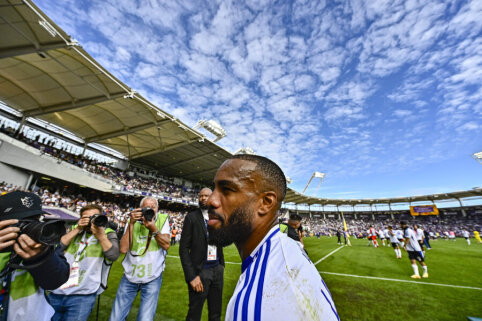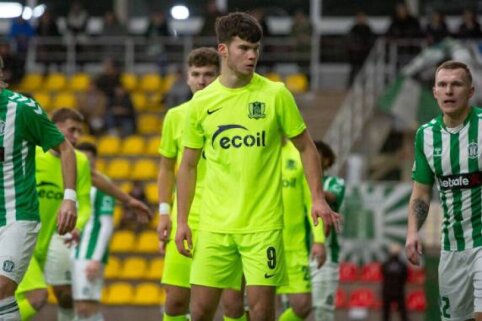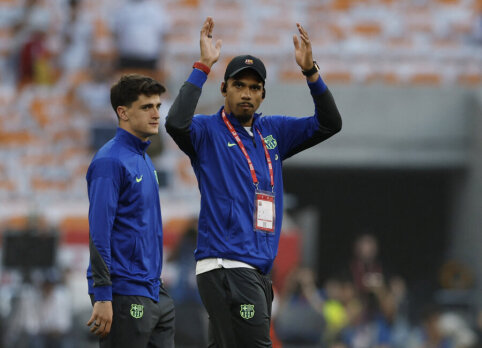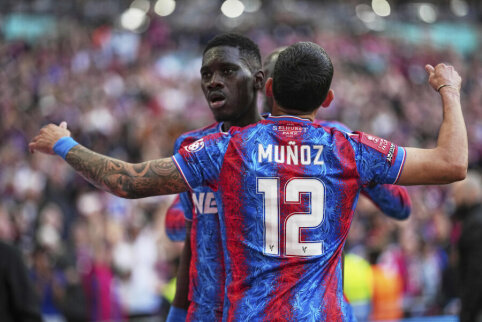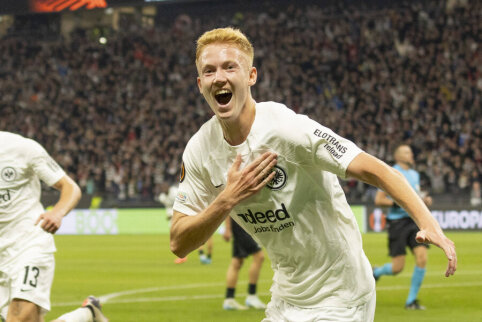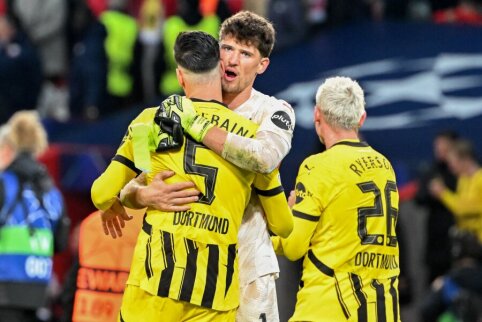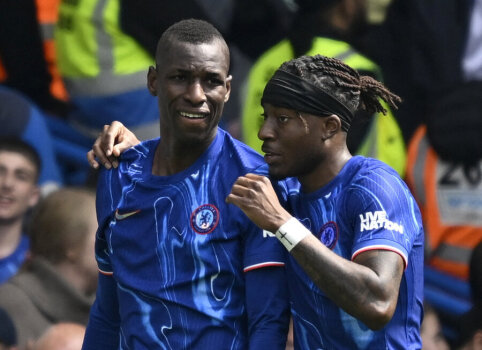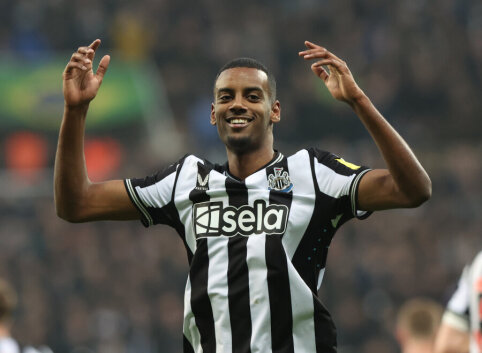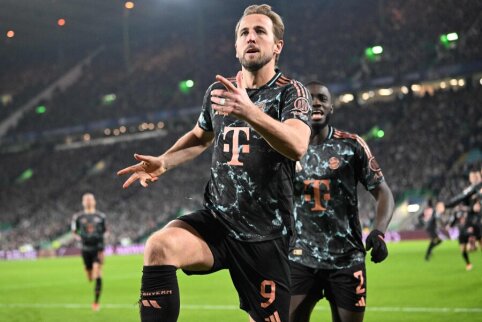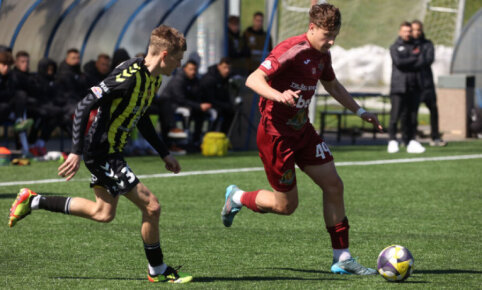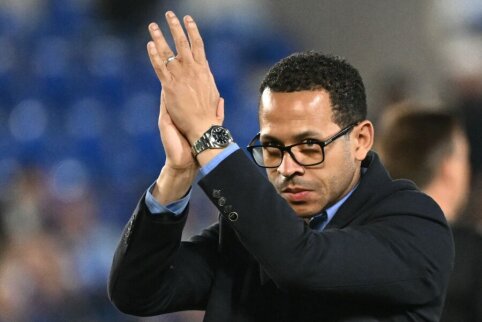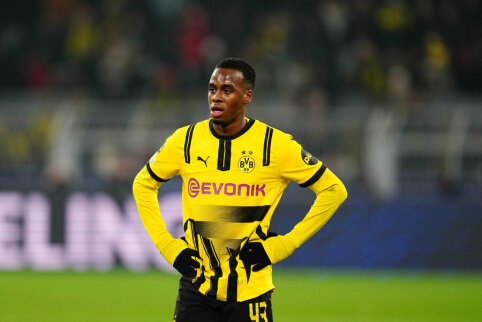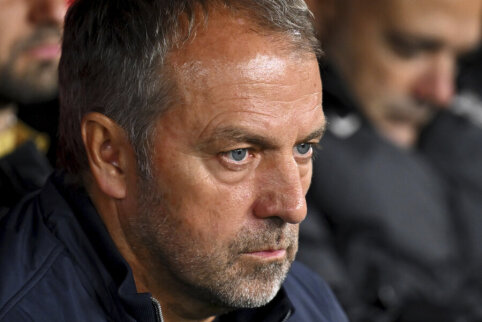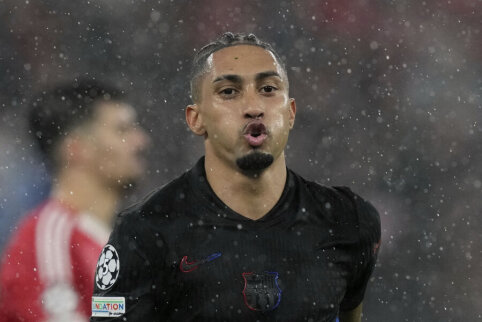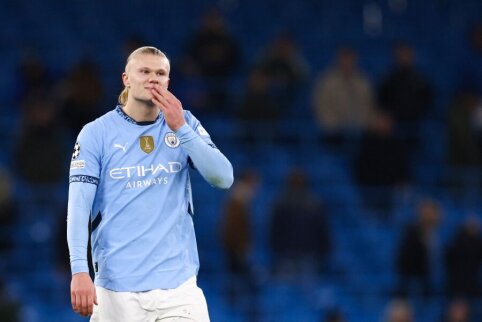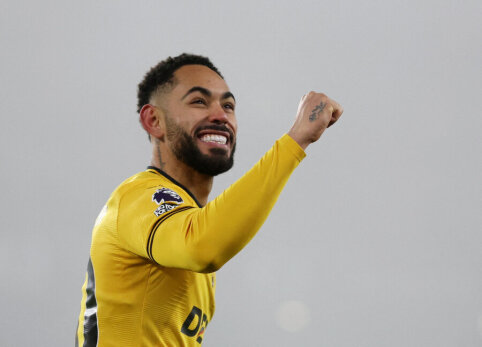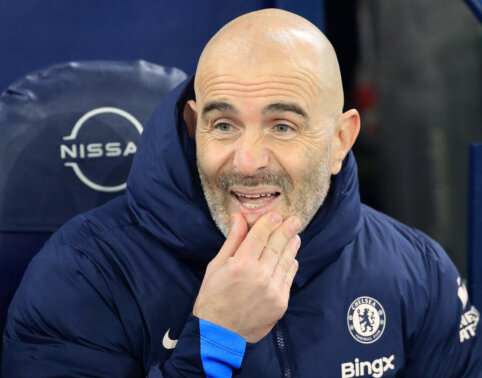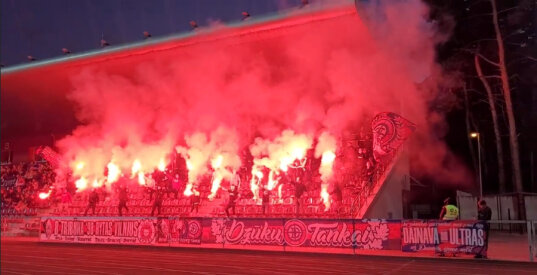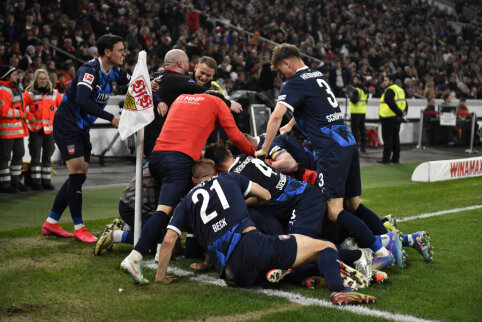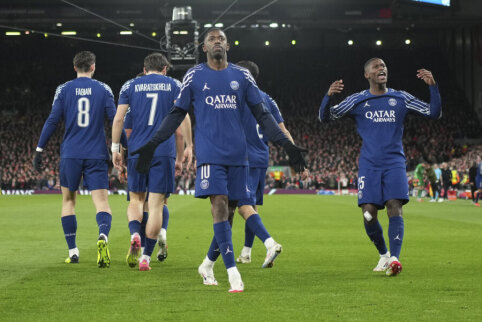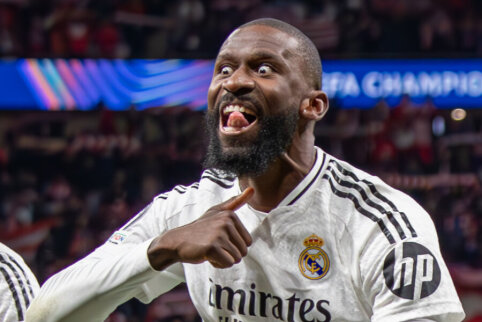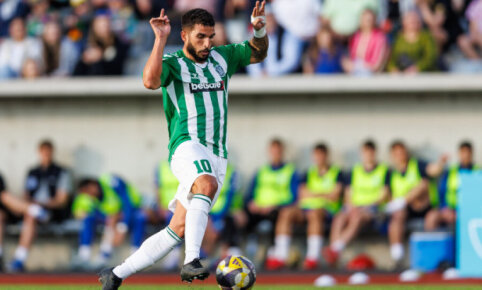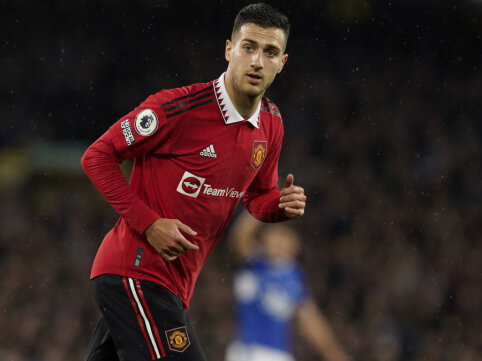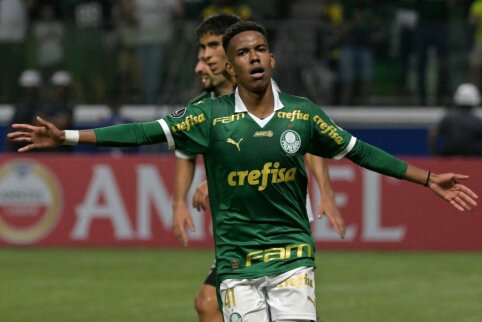 © EuroFootball.com
© EuroFootball.com
This time in "Tribūnas" we offer to read the work of EuroFootball.com visitor Vadimas about the review of the crisis of one of the most titled clubs, Real Madrid, in recent years and three seasons of this team without titles.
June 22, 2003 was the last Great day in the history of Real Madrid club. On that day, the Madridistas won the last great victory, defeating Athletic Bilbao with a score of 3:1 and becoming Spanish champions for the 29th time. After the season where the blancos competed head to head with the Real Sociedad club, the team celebrated the champions' title at the Cibeles Square, but the celebration was overshadowed by the sad departures of Fernando Hierro and Vicente del Bosque from the club's history.
This victory coincided with the end of an amazing Florentino Perez era. After the management decided to say goodbye to Vicente del Bosque and Fernando Hierro, a rebellion began within the team, which not only affected the players' performances but also led to constant changes in the club's management and life. Carlos Queiroz replaced Vicente del Bosque as head coach, and managed to win the 2003 Spanish Super Cup against Mallorca, but later a drought of titles began, which continues to this day.
Review of the last three years of failures:
2003/04 season: After Vicente del Bosque's departure, Florentino Perez, in consultation with Jorge Valdano, appointed inexperienced Carlos Queiroz as head coach. The team, led by the Portuguese, started the season well and until mid-March, Real Madrid was a contender for victories in all three tournaments they participated in, having previously won the Spanish Super Cup. However, due to the lack of players and the fact that Carlos Queiroz constantly fielded the same players, at the crucial moment of the season, the players ran out of strength and freshness. Painfully losing the Spanish Cup final to the Zaragoza club, the team never recovered. In the quarterfinals of the Champions League, the Madridistas were unexpectedly defeated by Monaco, and in the Spanish championship, Valencia managed to overcome the almost 10-point gap from Real Madrid and finish ahead of the blancos. Madrid finished the season without the Spanish Cup, without the Champions League Cup, and took 4th place in the championship behind Valencia, Barcelona, and Deportivo clubs.
2004/05 season: Florentino Perez won the presidential elections and appointed Jose Antonio Camacho as head coach to lead the club out of crisis. However, J.A. Camacho only lasted three rounds in the coach position, and then resigned, as he could not control the players. Mariano Garcia Remon was appointed as the new head coach, but it was clear that he would only hold this position temporarily. With him, the team's results did not improve, and during Christmas, Florentino Perez gave the team a new coach, Vanderlei Luxemburgo. The Brazilian achieved good results with the team and led them to second place. In the Champions League and the Spanish Cup matches, the team did not do as well, and Real Madrid said goodbye to the tournaments at the quarterfinals, losing to Juventus and Valladolid clubs, respectively.
2005/06 season: Vanderlei Luxemburgo started the season with great inspiration, and it seemed that the titles would soon return to the Royal club, but hopes remained only until the 14th round of the Spanish championship when Ronaldinho crushed Real Madrid at the Santiago Bernabeu stadium with a score of 3:0. This defeat determined the fate of Vanderlei Luxemburgo, and soon Juan Ramon Lopez Caro was appointed as the coach, who led the team to Segunda Division. He failed to bring Real back to the path of victories, and the team ended the season in second place, lagging behind Barcelona by 12 points. In the Champions League, the Madridistas were eliminated from the tournament by Arsenal, and in the Spanish Cup matches, after a crushing defeat against the Zaragoza club with a score of 1:6 away, in the return leg, Real had almost no chance to advance to the next round, but the players almost managed to perform a miracle and win 4:0, although it was not enough. At the end of the season, Florentino Perez resigned from the presidency of Real Madrid and appointed Fernando Martin to his post. However, he was soon dismissed, and the Junta Directiva decided to convene new presidential elections and appointed their senior member, Luis Gomez-Montejano, as interim president.
What are the reasons for the failures of these 3 years? Marca's journalists decided to identify and analyze the main ones: unsuccessful planning of the team composition, constant changes of coaches, the unique management model of Florentino Perez at the club, the advantage of marketing results over sports results, aging squad and the successful times experienced by Barcelona.
Unsuccessful team composition planning: The policy of "Zidanes and Pavons" that Florentino Perez tried to implement in the 2003/04 season did not yield the desired results and experienced a fiasco. The club only bought David Beckham, but sold Claude Makelele to Chelsea, who cemented the team's play in the midfield, and decided to trust young and inexperienced players who did not live up to expectations. After a fairly successful season with C. Queiroz, in which Real Madrid led the championship and fought for the Champions League, the team could not keep up the pace and unexpectedly played poorly at the end of the season, exiting the Spanish Cup, the Champions League, and suffering 5 consecutive losses in the Spanish championship (a club anti-record), including losing to the Murcia club, which finished last in the championship. The next year, Florentino Perez easily won the presidential elections and changed the club's transfer policy by buying two center-backs (Jonathan Woodgate and Walter Samuel, but the first did not even wear a Real jersey that season, and the second barely stayed in the team for one season) and Michael Owen, who left Real Madrid the following year due to an excess of forwards in the club. At the same time, Florentino Perez gifted Samuel Eto'o to Barcelona and sold Santiago Solari to Inter. In December, Thomas Gravesen joined the club to solve the team's problems, but his contribution to the team's play was not enough to win any title in the 2004/05 season. The following year, Arrigo Sacchi was invited to Madrid, and the club bought these players in the summer: Pablo Garcia, Carlos Diogo, Julio Baptista, Robinho, and Sergio Ramos, with only 2 of these 5 players remaining in the team. Cicinho and Antonio Cassano were purchased in the winter, with the latter now looking for a new club. Last summer, the controversial presidential elections, considered the most scandalous in the club's history, were won by Ramon Calderon and Predrag Mijatovic, who acquired Fabio Cannavaro, Emerson, Mahamadou Diarra, Jose Antonio Reyes, Ruud van Nistelrooy, Marcelo, Gonzalo Higuain, and Fernando Gago. In June, we will see if the path chosen was correct.
2003/04 purchases: David Beckham
2004/05 purchases: W. Samuel, M. Owen, J. Woodgate
2005/06 purchases: P. Garcia, C. Diogo, J. Baptista, Robinho, S. Ramos, A. Cassano, Cicinho
2006/07 purchases: F. Cannavaro, Emerson, M. Diarra, J. A. Reyes, R. van Nistelrooy, Marcelo, G. Higuain, F. Gago
Constant coaching changes: Carlos Queiroz, Jose Antonio Camacho, Mariano Garcia Remon, Vanderlei Luxemburgo, and Juan Ramon Lopez Caro. 5 coaches in 3 years. Instability in the coach's position was also accompanied by changes in the director of football position: Jorge Valdano, Arrigo Sacchi, and Benito Floro changed one after another, but did not solve the club's problems.
Florentino Perez's leadership style: During Florentino Perez's 6-year leadership, we saw two sides of the medal. During the first 3 seasons, the president led the club out of financial crisis, modernized the club's structure, earned huge money through marketing for the purchase of the world's best players like L. Figo, Z. Zidane, and Ronaldo, won 3 titles - 2 Spanish championships and one Champions League, as well as the Intercontinental Cup and the European Super Cup. However, from the 4th season, the club's sporting results declined, and on February 27, 2006, Florentino Perez left the club, admitting that he wore out the team's stars. The amazing results achieved in marketing and the first years where titles were won were replaced by a drought of titles.
Advantage of marketing results over sports results: Marketing and the pursuit of greater money became one of the main reasons for the crisis. Some club employees, including Jose Antonio Camacho, left because the players paid more attention to their image than to training. Traveling to Asia and North America, participating in various advertising events and parties (Ronaldo's failed marriage in France) held a very important place in the players' lives and pushed training to the background.
Aging squad: At a time when the great European football giants were looking for young talented players, Real Madrid bought experienced but already aging players, and some of the players in the squad are old. L. Figo, Z. Zidane, M. Salgado, I. Helguera, and R. Carlos played and some still play without substitutions, but they are already over 30 years old. This summer, R. van Nistelrooy, Emerson, and F. Cannavaro joined the team to finish their careers wearing the Real Madrid shirt, but during that time, the Real Madrid management bought young players like Cicinho, Marcelo, G. Higuain, and S. Ramos...
Successful times of Barcelona: The royal club crisis coincided with the beginning of successful times in Barcelona. The Catalans are currently experiencing one of the most successful moments in their history and took advantage of Real Madrid's crisis by winning the Champions League trophy and two Spanish champion titles. Comparing the squad, the displayed play, and the results, Barcelona currently surpasses Real Madrid, and when talking about Barcelona as the bitterest rival, 3 years without titles for Real Madrid seem like a tragedy, and the pain of defeats is felt even more strongly.
2002/03 champions who stayed in the club: I. Casillas, I. Helguera, M. Salgado, O. Minambres, F. Pavon, R. Bravo, R. Carlos, Guti, Raul, Ronaldo.
2002/03 champions who have already left the club: F. Hierro (retired), Ruben (Racing), E. Cambiasso (Inter), A. Celades (Zaragoza), L. Figo (Inter), C. Makelele (Chelsea), S. McManaman (retired), S. Solari (Inter), Z. Zidane (retired), F. Morientes (Valencia), J. Portillo (Gimnastic), Tote (Hercules).
Teams that won due to the Real Madrid crisis: Barcelona (Spanish champions 2004/05 and 2005/06, Champions League winners in 2006), Zaragoza (Spanish Cup winners in 2004), Valencia (Spanish champions 2003/04, UEFA Cup 2004), Real Betis (Spanish Cup 2005), Sevilla (UEFA Cup 2006), Espanyol (Spanish Cup 2006).
Worse periods:
1929/30 - 1931/32 seasons: It took Real Madrid 4 years to win the first Spanish champions title. In the first three seasons, Barcelona and Athletic Bilbao were stronger.
1935/36 - 1945/46 seasons: The 1936 Spanish Cup was Real's last title before the Spanish Civil War. After that, Real did not win any titles until 1946 when they again won the Spanish Cup.
1946/47 - 1953/54 seasons: another 7 years without titles, which ended in 1954 when Real won the Spanish championship, the first in 19 years. That Real was the beginning of the legendary Real, which dominated Europe in the sixth decade and won 5 European champions titles.
1979/80 - 1985/86 seasons: during this period, Real Madrid only won the Spanish championship twice, the Spanish Cup in 1982, and the UEFA Cup in 1985 and 1986. However, the drought of titles ended in 1986 when Real Madrid became Spanish champions five times in a row with the "Five Cups" plan.
1989/90 - 1994/95 seasons: for five seasons, blancos fans waited for the Spanish champions title as Cruyff's "Dream Team" dominated in Spain. In the Canary Islands, the Madridistas left two champion titles in the last rounds in 1992 and 1993, but in 1993, they won the Spanish Cup.
1996/97 - 2000/01 seasons: from Fabio Capello's departure to Vicente del Bosque's arrival, Madridistas waited 3 years for another Spanish championship. Fans were not very sad because in 1998 and 2000, the club won the Champions League.
The opinions of Marca's journalists. Will the title drought end in 2007?
Yes. Emilio Contreras: "Fabio Capello's teams have positive and negative sides. His team's style of play is not beautiful, not impressive, but for 15 years, his teams consistently achieved results. Real strengthened the most in winter, buying F. Gago, G. Higuain, and Marcelo, who will give the team a positive boost. Winning the Champions League will be very difficult, but I see Real Madrid competing with Barcelona and Sevilla for the Spanish champion title, and I am convinced that Real will focus on the Spanish Cup to return the team to the Cibeles Square, and this could be the shortest path."
No. Carlos Gonzalez Rodriguez: "It is impossible for Real to keep up with Barcelona and Sevilla. Real is not a strong team and in the past they survived only because of the individual mastery of their players, not their teamwork. Given the latest purchases, it does not seem that F. Capello's team will change their style of play, which makes them very vulnerable. The team in the Champions League is a step below Lyon, Barcelona, or Chelsea, so winning this tournament will be very difficult. The King's Cup could be closest to the set goal, but blancos have not won it in 14 years, and this title is like a curse. Personally, the current Real does not remind me of a team that could win any title."
